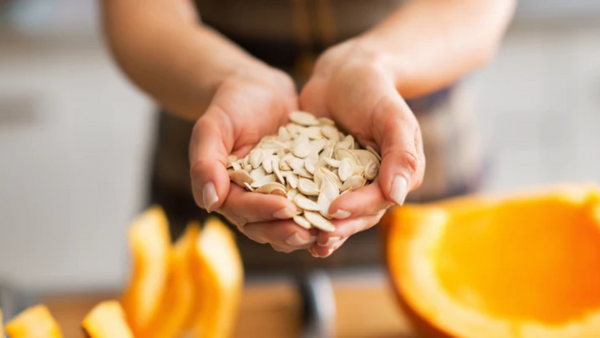Did you have trouble falling asleep again last night? Or did you wake up and want to get up, but then realize that it's only 2 a.m.? Do you feel exhausted and worn out even after many hours of sleep? Possible explanations could be poor sleep hygiene or even a lack of nutrients . In this article, we'll give you tips for better sleep.
IT'S WORTH READING!
AT THE END OF THE ARTICLE WE WOULD LIKE TO GIVE YOU A LITTLE JOY WITH A VOUCHER!
Hygiene - Also important in terms of sleep
Sleep hygiene is the term for the healthiest possible sleeping habits that help us to have a restful sleep and thus prevent or treat sleep disorders.
Healthy sleep is important for physical and mental health - not least because our overall quality of life depends on the amount and quality of our sleep. [1]
Your behavior during the day - not just before bed - affects how well you sleep at night. The drinks you drink, the food you eat, your schedule, your evening routine - all of these and more play a role in how well you sleep at night.
Symptoms of sleep deprivation
Lack of sleep can manifest itself in various ways, and not all of the signs always have to appear together. In addition to the most obvious symptom - tiredness - the following signs can indicate an existing, permanent sleep deficit: [2]
- Increased irritability
- Concentration problems
- Burning eyes
- Reduced sex drive
- Headache
- Feeling of exhaustion
- Shivering
- Microsleep
- Mood swings
Effects of lack of sleep on the body
Chronic sleep deprivation can affect several aspects of your health, including:
- Hormone balance . Inadequate sleep can affect hormone production, including the production of growth hormones and testosterone. It also causes the body to release additional stress hormones such as norepinephrine and cortisol. [3]
- The immune system . Sleep deprivation can make a person more susceptible to infections and respiratory diseases. [4]
- The brain . Lack of sleep affects the prefrontal cortex, which is responsible for logical thinking, as well as the amygdala, which deals with emotions. Lack of sleep can also make it harder for a person to form new memories. This can affect the ability to learn. [5]
- The cardiovascular system . Sleep helps the heart vessels to heal and rebuild and influences processes that maintain blood pressure and blood sugar levels. Too little sleep can increase the risk of cardiovascular disease. [6]
- Weight . Sleep can affect the hormones that control hunger and satiety. It can also trigger the release of insulin. Sleep disturbances can cause increased fat storage, changes in body weight, and a higher risk of type 2 diabetes. [7]
How can I improve my sleep: habits and circumstances
If you're having trouble sleeping, there are a number of things you can do during the day. We've listed 7 of them for you here.
1. Create an evening routine
Having a consistent bedtime routine signals to your body that it's time to wind down. This can help you fall asleep faster.
A 2009 study showed that introducing an evening routine in babies and toddlers led to improved sleep quality. [8]
The routine should start about 30 to 60 minutes before bedtime. It can include anything that relaxes you: a warm bath, reading, writing in a journal, mindfulness exercises or meditation.
However, you should avoid electronic devices such as cell phones or tablets. Researchers at the University of Manchester discovered that the light from electronic devices, regardless of the blue component of the light, can disturb our sleep. It is therefore best to avoid any screens before falling asleep and to pick up a book. [9]

2. Limit caffeine consumption
The effects of caffeine can last up to 7 hours after consumption, meaning your afternoon cup of joe may be keeping you awake much longer than you'd like.
Caffeine is a stimulant that can keep you awake. According to the Division of Sleep Medicine at Harvard Medical School, it can take six to eight hours for the effects of caffeine to wear off, so avoid drinking caffeinated beverages like coffee or soda in the late afternoon or evening. [10]
3. Stick to a sleep schedule
Sleep should also be planned - ideally. This means that you should try to go to sleep and wake up at roughly the same times every day, even on weekends. This strengthens your body's sleep cycle and adjusts the internal clock, which in turn can improve sleep quality. [11]
In addition, sticking to a fixed schedule can minimize daytime fatigue.
4. Short or no naps
Do you like to take a siesta? That's fine in principle. However, you should know that sleeping during the day reduces sleep pressure and can make it harder for you to fall asleep in the evening or cause you to wake up more often during the night. [12]
If you still need to take a nap, limit it to 30 minutes maximum and don't schedule it until late afternoon.

5. Exercise regularly
Just 30 minutes of aerobic exercise a day can improve your sleep quality and overall health. And if you can exercise outside, the benefits can be magnified even further because natural light helps regulate your sleep cycle. [13]
But if you can't go outside, don't worry. Regular exercise indoors can also help you sleep better. Just avoid exercising within an hour or two of bedtime, as this can increase your energy levels and body temperature, making it harder to fall asleep.
6. No stress before going to bed
Worries, problems and thoughts can keep you awake at night. Here are four little tips that might help you deal with them:
- Write down your worries before you go to bed to get them out of your head.
- If your to-do list is stressing you out, prioritize the things you need to do tomorrow and the rest of the week.
- Research suggests that a weighted blanket can help with anxiety and insomnia, offering similar benefits to deep pressure therapy. [14]
- Try meditating before bed to calm your mind.

7. The right sleeping environment
A cool, dark, quiet room can help you fall asleep and stay asleep more easily. For most people, a bedroom temperature between 15.6°C and 19.4°C is the optimal sleeping temperature. [15]
If you're a light sleeper or have noisy neighbors, a good pair of earplugs can help you sleep undisturbed. Also, if your bedroom is flooded with too much light, use blackout curtains or an eye mask to keep your sleeping environment as dark as possible.
How can I improve my sleep: nutrition and nutrients
Not only our habits, but also our diet has a major impact on our sleep. Here is a selection of nutrients whose deficiency can be responsible for poor sleep: [16]
magnesium
Magnesium is necessary to convert L-tryptophan into serotonin. Serotonin is needed for the formation of melatonin, a hormone produced in the pineal gland that controls the day-night rhythm of the human body.
A lack of magnesium indirectly limits the production of the sleep hormone melatonin, which automatically leads to poor sleep quality.
Furthermore, magnesium is essential for the stimulation of the inhibitory neurotransmitter γ-aminobutyric acid (GABA). The ingredients of GABA are said to ensure that the body can relax and thus regulate sleep.
iron
This element plays a central role in the body's energy balance and - apart from energy production and oxygen transport - is also important for the formation of hormones such as dopamine, serotonin and melatonin. A deficiency can manifest itself in sleep disorders and a depressed mood. [17]
As a study shows, mitochondrial dysfunction caused by iron deficiency is also present in the idiopathic form of restless legs syndrome (RLS) - i.e., not related to other diseases. People suffering from RLS cannot rest at night because an uncontrollable urge to move their legs while lying down robs them of sleep. [18]
B vitamins
- Vitamin B1 has a significant impact on sleep quality because, among other things, it is related to the metabolism of the adrenaline system in the central nervous system. Because the biochemical processes of sleep take place in the nervous system, vitamin B1 can have a significant impact on sleep quality. Even a small deficiency can cause sleep deprivation and lead to depression because the serotonin concentration in the tissue and brain is reduced.
- Vitamin B3 (niacin) helps maintain the health of the nervous system. In addition to lack of sleep and depression, a lack of niacin can lead to disorders in the nervous system and, in the worst case, even cause psychological changes.
- Vitamin B6 plays a central role in glucose metabolism and thus in maintaining blood sugar levels. If there is a deficiency of this vitamin, which causes a drop in blood sugar levels, adrenaline is released. This in turn can be the cause of early or frequent awakenings.
- A vitamin B12 deficiency plays a role in psychological symptoms such as mood swings, depression or psychosis. It can cause difficulty falling asleep and even lead to sleep deprivation. Studies have shown that the administration of vitamin B12 could be a possible method for treating insomnia. [19]
Vitamin C
Vitamin C is needed to convert the amino acid tryptophan into serotonin. A high serotonin level in the brain and tissue promotes sleep quality. A low vitamin C level therefore leads to a low level due to the reduced synthesis of serotonin - the result is a lack of sleep.
Vitamin D
The sun hormone vitamin D also affects the quality of your sleep. A deficiency leads to daytime fatigue and a much poorer quality of sleep. [20]
L-tryptophan
This essential amino acid is a starting material for the production of serotonin. This in turn is involved in the regulation of sleep, among other things. As a precursor to melatonin, tryptophan is therefore partly responsible for the sleep-wake rhythm.
A lack of tryptophan leads to disturbances in serotonin metabolism. The consequences are longer times to fall asleep, problems sleeping through the night and massive sleep deprivation.
copper
If there is a lack of copper in the body, the reduced excretion leads to an increased adrenaline level. This can cause cardiac arrhythmias, which lead to a lack of sleep.
Melatonin
Melatonin has a mild soporific, calming effect and leads to drowsiness and sleep. Particularly high concentrations of the hormone are reached during the night. The hormone produced by the pineal gland is responsible for regulating the sleep-wake rhythm, so any deficiency has a direct impact on our sleep.
Conclusion: close your eyes and get through it?
Healthy sleep is the basis of physical and mental health. This also means having healthy sleep habits. Your behavior, both during the day and before bedtime, can affect the quality of your sleep.
If you continue to have problems with your sleep patterns or insomnia despite these tips, be sure to see a therapist. They can determine if your sleep problems are caused by an underlying medical condition and can provide you with the treatment you need.
AS PROMISED, YOU WILL RECEIVE A 10% VOUCHER ON THE FOLLOWING PRODUCTS:
Vitamin B complex, vitamin b complex forte, vitamin B12, vitamin C, vitamin D, magnesium, L-tryptophan, zinc & copper
SIMPLY COPY THE CODE SLEEP+V10 AND ENTER IT AT CHECKOUT.
Click here to shop
[1] https://www.ncbi.nlm.nih.gov/pmc/articles/PMC4400203/
[2] https://www.ncbi.nlm.nih.gov/books/NBK547676/
[3] https://www.ajandrology.com/article.asp?issn=1008-682X;year=2014;volume=16;issue=2;spage=262;epage=265;aulast=Wittert
[4] https://www.ncbi.nlm.nih.gov/pmc/articles/PMC2876696/
[5] https://www.ncbi.nlm.nih.gov/pmc/articles/PMC7007500/
[6] https://journals.sagepub.com/doi/10.1177/2047487317702043
[7] https://pubmed.ncbi.nlm.nih.gov/22402738/
[8] https://www.ncbi.nlm.nih.gov/pmc/articles/PMC2675894/
[9] https://www.manchester.ac.uk/discover/news/researchers-discover-when-its-good-to-get-the-blues/
[10] https://healthysleep.med.harvard.edu/healthy/getting/overcoming/tips
[11] https://www.ncbi.nlm.nih.gov/pmc/articles/PMC7423117/
[12] https://www.ncbi.nlm.nih.gov/pmc/articles/PMC6180010/
[13] https://pubmed.ncbi.nlm.nih.gov/29135639/
[14] https://www.tandfonline.com/doi/full/10.1080/0164212X.2015.1066220
[15] https://www.ncbi.nlm.nih.gov/pmc/articles/PMC3427038/
[16] https://pubmed.ncbi.nlm.nih.gov/17825610/
[17] https://pubmed.ncbi.nlm.nih.gov/32224451/
[18] https://movementdisorders.onlinelibrary.wiley.com/doi/10.1002/mds.27482
[19] https://pubmed.ncbi.nlm.nih.gov/1759094/
[20] https://pubmed.ncbi.nlm.nih.gov/29143127/

















